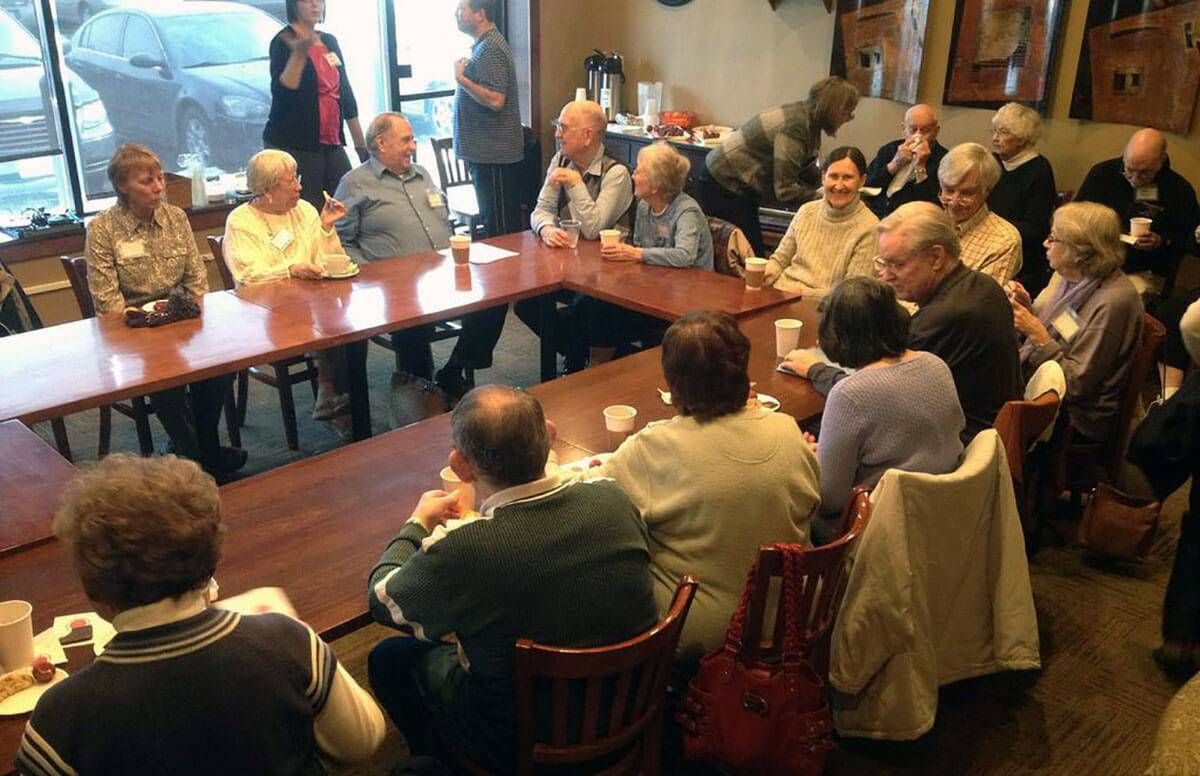Memory Cafes Offer Connection in Dementia
Caregivers and people with the condition come to feel supported
They’ve been married for 67 years, but sometimes, John Sweeney says his wife Virginia, 86, doesn’t remember who he is.

Virginia lives with dementia and experiences sundowning, a late-in-the-day phenomenon that brings out belligerent, combative, or disoriented behavior. “She gets confused and thinks she has to go somewhere else,” said John, 88, of Roseville, Minn. “She’ll say, ‘Do I have my father’s car here? Where is the lady I came here with?’”
“I tell her I’m glad she wasn’t traveling with a man,” John said, laughing. “But most of the time, I explain her father was gone before I met her. In her worst case, she doesn’t believe me and I can’t convince her otherwise. Five minutes later, it comes back to her who and where we are.”
One thing that helps both of them: visiting with others sharing similar challenges at a "memory cafe" in Roseville, Minn.
What’s a Memory Cafe?
Caregiving for those with dementia — an umbrella term for memory loss and other cognitive changes that can encompass more than 100 diagnoses including Alzheimer’s disease — can be stressful and lonely. Memory cafes exist to help shoulder a bit of the burden and provide community, activities and information for both the caregiver and the person with dementia.
Located in libraries, houses of worship, community centers and similar locations, memory cafes welcome people with dementia and their caregivers to spend time together socializing, listening to music and playing games. While they don’t allow drop-offs, the cafes are typically run by social workers, medical professionals or others familiar with dementia.
The condition affects more than 47 million people worldwide, according to the World Health Organization.
“A new case of dementia is diagnosed somewhere in the world every 3 seconds,” said Lori La Bey, the founder and owner of Alzheimer’s Speaks, an advocacy and media outlet for caregivers and those living with Alzheimer’s disease and dementia. She also runs Arthur's Memory Cafe, what she says was the first memory cafe to launch in the United States, in Roseville, Minn., in 2011, and helped bring the concept to the U.S. from the United Kingdom.
To find a memory cafe near you in the United States, consult the Memory Cafe Directory, which currently lists more than 300 cafes. While research on memory cafes in the United States is scant, studies on overseas cafes have shown their benefits. One small study published in BMC Geriatrics in 2017 said caregivers in the United Kingdom found such cafes useful and called for more research to study their benefits.
Camaraderie and Support
For Cyndy Luzinski, an advanced practice nurse and a certified dementia practitioner who co-runs several memory cafes in northern Colorado, the satisfaction of helping others is immeasurable.
“It doesn’t take much to create joyful moments for other people, and you can do that in such a simple way, even if the people don’t recognize our names or faces,” she said. “They will always recognize beauty, kindness and love. We can laugh together and have a good time together. It’s gratifying to help people who feel like they are in a situation that is hopeless.”
Luzinski, who facilitates the groups with friend and colleague Andrea Scandrett, plans monthly meetings with snacks, devotions, trivia contests, music and themes, such as “Back to School” or “Hawaiian Luau.”
Participants “get to share and be in the moment, and we help them recall the significant events in their lives, such as who their favorite teachers were in school,” Luzinski said. “I have pictures of old playground scenes, and when people saw them, they’d say [things like], ‘I remember falling off the monkey bars,’” she said.
Luzinski and Scandrett ask people to talk about their parents and grandparents, rather than their children or grandchildren. “The further people go with dementia, the further back they go with their memories,” Luzinski said. “They are more likely to keep those. What we don’t ask are things like ‘What did you do last week?’ or ‘What did you have for dinner last night?’”
Benefits for All
Memory cafes are a social outlet for caregivers, too. “Often, they feel like they can’t go out because they don’t know where their loved ones will be supported. Here, it’s OK if a loved one repeats himself, or the words don’t come out real quickly. It’s a safe environment,” Luzinski said.
Processing the many emotions dementia brings for caregivers is another benefit.
“Caregiving can be a lonely job, and coming to the memory cafes is a way to let your hair down and emphasize with people on the same journey,” said John Sweeney, who attends La Bey’s memory cafe regularly. He said many other families describe relatives who deny dementia’s impact or who resent the caregiving burden. Sharing insights helps raise awareness.
“My message is, don’t be ashamed of dementia,” he said. “One of the greatest things people face is the lack of understanding in public, and the rudeness. We deal with an illness just like any other illness.”

